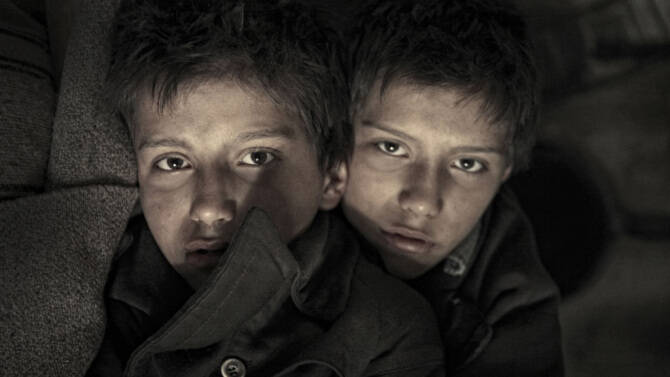I viewed Janos Szasz’s strange and prize-winning film The Notebook the same week that Israel’s invasion of Gaza, allegedly to punish Hamas for aiming rockets at Israel, reached its ugliest pitch. As this is written 1,650 citizens of Gaza, mostly civilians, including 500 children, and 64 Israeli soldiers have died. In some photographs a Gaza neighborhood is nothing but a pile of rubble. Targets have included homes, schools, power plants, water filtration stations, U.N. buildings—both the homes and all the places to which families flee to be safe. In the media I’ve seen, only Eugene Robinson of The Washington Post and Chris Hayes of MSNBC clearly state that for a military action to be justifiable it must be proportionate to the offense; and killing whole families at a ratio of 1,650 to 64 is not. “A civilized nation does not repay every heinous act in kind,” Robinson wrote.
How can the civilized world just shake its head and allow this to continue? Is there some kind of “moral math” that dictates that a relatively small group of killed soldiers has more value that 500 innocent children?
Owen Jones, writing in the Guardian (7/25), suggests that occupying countries, including the United States and England, inevitably corrupt themselves. Israel, with its powerful military with nuclear weapons, still nourishes the victim mentality and cannot imagine itself an oppressor. When 1,650 Palestinians die, it must be their own fault.
Now the first thing to keep in mind while watching “The Notebook,” is that it is a radically different media genre than the newspapers, radio and TV news, press conferences and op-ed essays that bring us Gaza. “The Notebook” is a fairy tale, rather a parable, wide open to interpretation, with a nagging impetus to ask the fellow next to you, “What was that all about?” On one level it is about the moral impact of any war; specifically, at each stage of the war, what is the individual’s moral responsibility to another person?
Characters have no names, merely titles to identify them. It’s a Hungarian movie set in a miserable country house near a little town, with what looks like a prison camp on the other side of barbed wire fences. The story centers on 13-year-old twins, whose parents split when the father goes away in the army and the mother goes somewhere else, leaving the boys with their grandmother, a huge, fat, ugly, brutal nag with no love for her neglectful daughter and less affection for the grandchildren. The father leaves strict directions: they must study, read the Bible and an encyclopedia, and every day write what they learn in a notebook which he gives them.
Meanwhile the twin boys overhear their parents talking about the destructive forces of war and determine to resist personal punishments by toughening their bodies and feelings to the point that nothing will ever hurt them. They beat, whip and starve one another to the point where no intervention will break them. We follow them through a string of wild events.
A nasty girl with a split lip accuses them of stealing in a café and they’re pursued and beaten. They find a soldier freezing alone in a blizzard and return with food to find him dead. They take his hand grenades home and hide them. A shop girl sees how filthy they are and takes them in. The next day the girl yells insults as a silent procession of Jews trudges under her window en-route to the camp. Later the boys place the hand grenades in her stove and it explodes in her face.
Policemen arrest and torture them. A German commander (a Von Stroheim knock-off, including a neck brace), whose troops are stationed at their farm, feels affection for the boys, appears in the police station, pulls his Lugler and kills the chief.
The war ends. A huge tank, filled with people of unidentified nationality, rumbles across a field as the split-lip girl waves a welcoming flag and climbs aboard the tank. We next see her naked body sprawled on a cot, having been raped to death. The boys’ mother appears out of nowhere carrying a new baby girl. The boys refuse to let her in and she is killed by a bomb. I will not reveal here what happens to their father, but it leaves the audience shaking their heads.
The irony, of course, is that in order to keep the war from compromising their humanity, the boys have ruined themselves. They have avoided the war, but learned to kill their fellow men and women methodically.
In short, we can’t save ourselves by withdrawing from political responsibility. In the Chronicle Review (8/1) Jan Mieszkowski, a professor at Reed College, comments on the picture of Israelis who bring their camp chairs and popcorn to a hilltop to watch the bombardment of Gaza as “Successful strikes elicit cheers and applause.” They gathered at the same spot to enjoy the bombing in 2009. News reports, he writes, descried this as either “a ghoulish form of voyeurism, while others have argued that it is simply a normal feature of the wartime dehumanization of the enemy.”
“The Notebook” will open in New York and Los Angeles on Friday, August 29.








